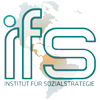Dear Friends of the Institute of Social Strategy,
We have a number of things to report in this monthly update:
- Change of Management: Introducing Kristína Janackova, and thanking Anne Häseker
- New publications: Research areas Economy and Global Civil Society
- Summary report of our annual conference: Science as an actor of civil society
Warm regards
Ulrich Hemel, Director und Kristína Janackova, Management
IfS Team
From 01 September 2022, Kristína Janackova will take over the management of IfS and thus replaces Anne Häseker. We thank Anne for 4 years of fantastic and never-faltering management work! Please join us in extending a warm welcome to Kristína.
Read here Kristína’s introduction:
Kristína Janackova studied Media and Culture Studies and German Literature (BA) in Freiburg and Vienna. She is currently completing a Masters in Literature and Cultural Theory at the University of Tübingen. Her research interests lie in the areas of Roma and Disability Studies. She has a track record of volunteering for non-governmental organisations, with a particular focus on working with Roma children and refugees. Her latest project was a fact-sense-checking project in her home country, Slovakia. From September 2022 she will take over the management of the Institute of Social Strategy.
Publications
Economy
Abstract [en]: In many cases, the starting point of today’s global devastating crises is the failure of individuals or groups because of egoistic behaviour patterns and the loss of mutual trust. In the context of companies and organizations, an answer to this self-perpetuating system is the promotion of cooperation among employees. This can be achieved by developing a “zone of cooperation”, in which a sense for fairness but also for a sportive performance principle is being fostered and also, every member’s contribution is being esteemed and zero-sum game-situations are being shunned. The newly developed “Tübingen Concept of Co-operation” structures those approaches and supports the ethics of professionality, of credibility and of conflict. The Concept of Co-operation with its included Process-matrix renders possible to measure the effect of cooperation on the creation of value and sustainability.

Carolina Weyde: Culture-senstivie leadership in non-profit organizations
Abstract [en]: This paper is about culture-sensitive leadership in non-profit organizations with special focus on the German children and youth welfare system. The underlying research question investigates the personal traits, competencies and abilities that team leaders of that sector need in dealing with employees which do not have the same cultural background they have, the challenges among their social interaction and the support needed by employers in this regard. […]
Global Civil Society

Abstract [en]: In his essay „Hannah Arendt: Re-thinking freedom“, Dr Bruno Heidlberger shows how the philospher’s analyses are as topical as ever. Today, thinking about Arendt’s conception of the political is not possible without reference to the 24th February 2022, as it goes to the heart of Hannah Arendt’s political philosophy: freedom of agency, and concepts such as power, violence, ruling, totalitarianism, plurality, republicanism, revolution, and progress. […]
Events
Our annual conference took place on 4 and 5 August 2022 in the “Clemenshaus” in Hannover. The conference topic was “Science as part of civil society”.
Read here the conference report by Oliver Bülchmann, that both supplies sufficient detail and pointedly cuts to the chase:
Abstract [en]: Recent epochal events, such as the pandemic, natural disasters, climate change, global migration movements motivated by hunger, scarcity of resources, lack of life prospects and, last but not least, a terrible war of aggression, have disproved previous certainties in a devastating way. What can science and civil society do in the face of this immense challenge?
Civil society is dependent on well-founded knowledge and up-to-date findings from a wide range of scientific disciplines in the most diverse areas, whether they are concerned with people or the environment. Civil society engagement and scientific discourse touch each other, can interpenetrate and mutually promote each other. What is the interplay between the individual actors and interests? How can political decisions benefit equally from civil society engagement and scientific knowledge? The cooperation partners Institute of Philosophy in Hanover, the Welt Ethos Institute in Tübingen and the Institute for Social Strategy addressed this range of questions at a scientific conference.The following conference report gives an insight into the main contents, thoughts and discussions of the event. Concepts such as the demand for a “science-capable democracy”, the claim for an “intersubjective science” that is not based on subjective value judgements, are reflected upon as well as the naming of practical means and possibilities for an effective interpenetration of the scientific and civil society spheres. Furthermore, a critical appraisal of the conference from the author’s point of view is made and a connection to the weaknesses of the social discourse in the spectrum of deficits in action and implementation in politics, economy and science is established. Finally, research questions derived from the discussions with a focus on civil society are formulated and an outlook on the need for research is derived. The article concludes with an attempt to outline a vision for a productive interplay between science and civil society in a democracy capable of reflection and judgement.
Copyright © 2022 Institut für Sozialstrategie, All rights reserved.
You are receiving this email because you opted in via our website.
Our mailing address is:
Institut für Sozialstrategie | Bleichwiese 3 | Laichingen 89150Germany
Add us to your address book
Want to change how you receive these emails?
You can update your preferences or unsubscribe from this list.


